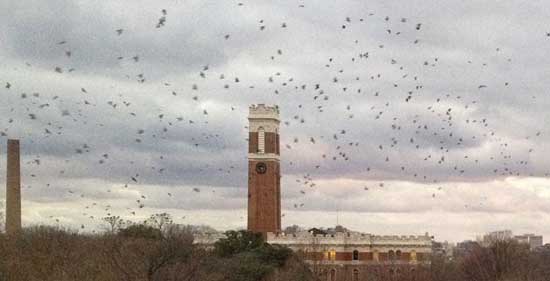
NOTE: Weather permitting, the effort to disperse roosting crows will begin on Thursday, Jan. 26, around 4 p.m. Inclement weather may postpone the effort until a future date.
Sounds of cannon fire and fireworks will fill the air in the early evening beginning Thursday, Jan. 26, as Vanderbilt undertakes its latest effort to drive roosting birds from campus.
In recent weeks, hordes of crows have gathered in the branches of trees to roost. The results have been loud squawking and potentially hazardous bird droppings.
The infestation is chiefly confined to two locations, the corner of West End Avenue and 21st Avenue South and the corner of 21st Avenue South and Wesley Place, according to Mark Petty, assistant vice chancellor for Plant Operations. As done in previous years, humane methods of dispersal – including noise-making devices – will be used to frighten them away without causing harm.
Noisemakers and pyrotechnics will be deployed through Feb. 8 between 5:30 and 7 a.m., when the birds typically leave their roosts, and from 4:30 to 6 p.m., when they normally return to their roosts.
The loudest noises will take place in the afternoon, when propane percussion cannons (non-projectile) and pyrotechnics will be enlisted in an effort to frighten off birds without hurting them.
“The birds’ roosting patterns will have to be disrupted continuously for several weeks before the birds get the idea,” Petty said.
Almost 12 years ago, Vanderbilt was under siege by more than a half-million birds. That was the first time the noise war against the birds was used.
“We don’t have as many birds now as we did several years ago, but we need to stop the problem,” Petty said. “We learned a lot from that situation.”
The latest operation will concentrate on the north and central campus, including Kissam Quadrangle, Vanderbilt Law School, Curry Field and the Owen Graduate School of Management.
Petty said he first became aware of the most recent infestation in December when faculty and staff parking their cars near the corner of West End Avenue and 21st Avenue South began complaining about an increase in droppings deposited on cars – and pedestrians.
“We will continually clean up areas where there are significant bird droppings to prevent any health hazard,” he said.
Louise Hanson, medical director and physician at the Vanderbilt Student Health Center, explained histoplasmosis is the danger.
“When the bird droppings below the roost mix with the soil and then turn to dust, people walking in the area can breathe in the particles and potentially become infected. Most people will clear the infection and not even have symptoms, but some will have symptoms that can range from a mild, flu-like illness to severe lung disease.”
The birds are attracted to Vanderbilt because of the large number of magnolia trees on campus. The trees keep their leaves and berries throughout the winter creating an inviting roosting area for starlings, blackbirds and crows.
Contact: Mark Petty, (615) 322-2622
mark.a.petty@Vanderbilt.Edu